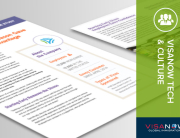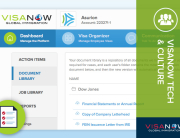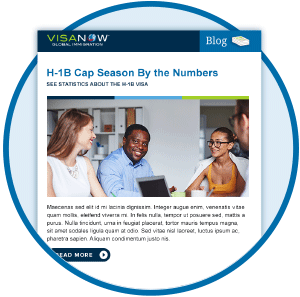Imagine being alone in a new city. Maybe your parents are on the opposite side of the world. Maybe your wife and children are there, too, waiting until the end of the school year to join you. Everything in your life is in flux.
For many visa and green card holders (“expats”) working in America, they wear two hats. They are new employees in your organization with all the accompanying jitters, but they are also first-generation immigrants to a new world. Their employment experiences are linked to their life experiences and associated with many feelings: hope, optimism and a solid belief in the entrepreneurial opportunities that the United States has to offer.
However, being an employee going through the immigration process can also involve uncertainty, loneliness and questions about how to navigate a working arrangement that is incredibly complicated.
Here are three ways you can see the candidate and employee experience through the eyes of the global workforce.
1. Expats integrate well into company culture with customized help.
Recruiters understand there are various degrees to which all employees will embrace your corporate culture. Both domestic workers and expats will stay for competitive pay, rewarding job duties and good co-workers. But cultural acclimatization can make or break an expat’s employee experience.
In Global Talent Perspectives 2016 (a survey of 700 visa and green card holders commissioned by Envoy) the most significant benefits that help expats adapt to a new job are additional orientation training, cultural assimilation training, language classes and mentoring. Companies can be helpful during the assimilation process and beyond by offering amenities such as prayer rooms and authentic cuisine. Recruiters should reach out to local civic leaders or not-for-profits to research culturally appropriate resources available in the community.
Key takeaway: It’s important for recruiters to highlight how they will help expats assimilate into your organization at the beginning of the hiring process. If your company lacks these programs, it’s time to start thinking about how your total rewards plan intersects with your global mobility and workforce planning strategies.
2. Speedy onboarding is essential.
Onboarding is a crucial step in hiring all workers. Once an offer is extended, expats have varied experiences when it comes to timing and process.
Global Talent Perspectives 2016 reveals that most expats (54 percent) start their first day of work within four months of their screening interview. That’s good news. The bad news is that momentum varies across job types. Non-STEM expats tended to be more bothered by the slow process. They are troubled by the lack of transparency in the onboarding process and worry about the lack of guidance offered to family members.
Key Takeaway: While no perfect onboarding program exists, recruiters can collaborate with their global immigration services provider to focus on speed and communication during the crucial onboarding stage.
3. Green card sponsorship and a strong employee experience matter.
Human resources departments spend countless hours managing change and confusion within enterprise organizations. It makes sense that visa holders favor companies with a clear and established green card policy. Having a green card sponsorship program makes life easier for recruiters and expats alike, because your business is distinguished from competitors and appeals to top talent.
An established green card policy isn’t enough. Most expats prefer companies with immigration-related perk packages. Recruiters should highlight transportation benefits, housing allowances, travel opportunities to return to the home country, and any available benefits for family members.
Key Takeaway: Recruiters often have an employer branding strategy for domestic recruiting practices. Not having a similar plan for expats could cause you to lose out on talent.
In the global economy, we can’t ignore that all candidates have diverse cultural backgrounds and unique drivers and goals. Recruiters and HR leaders give themselves a competitive advantage when they see the world through the eyes of the candidates and employees—domestic and foreign. Give yourself an edge and attempt to understand the expat experience.
 Laurie Ruettimann is a former human resources leader turned influential speaker, writer and strategist. She owns a human resources consultancy firm that offers a wide array of services to HR leaders and executives. Reuttimann sits on the strategic advisory boards at Vestrics and BlackbookHR, two HR technology firms focused on learning analytics, big data and employee engagement. She is also recognized as one of the Top 5 career advisors by CareerBuilder and CNN.
Laurie Ruettimann is a former human resources leader turned influential speaker, writer and strategist. She owns a human resources consultancy firm that offers a wide array of services to HR leaders and executives. Reuttimann sits on the strategic advisory boards at Vestrics and BlackbookHR, two HR technology firms focused on learning analytics, big data and employee engagement. She is also recognized as one of the Top 5 career advisors by CareerBuilder and CNN.








